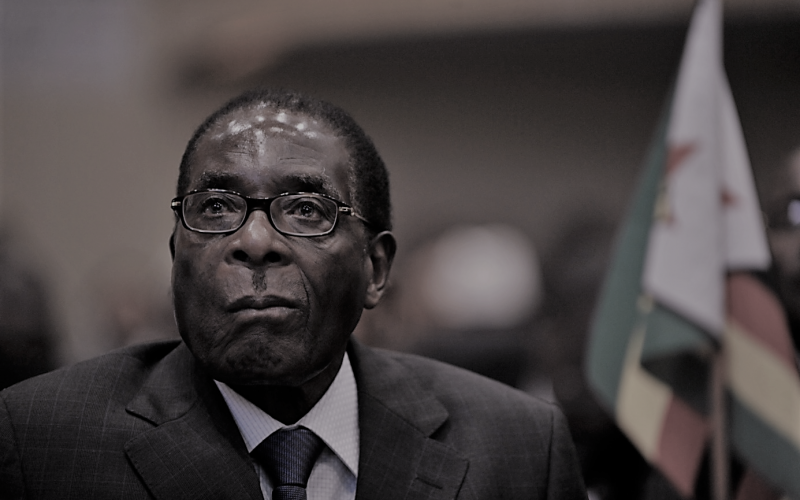This blog post is in English and Dutch. Scroll naar beneden voor de Nederlandse versie.
Robert Mugabe’s presidency illustrates a problem several countries are wrestling with. Their leaders have had military careers, whose personalities are shaped by long years in combat – and all the traumas that such experiences bring.
When people live under extreme stress for protracted periods, it changes their personality and character. They may become unstable and on the edge with explosions of impulsive behaviors. They become suspicious and develop symptoms of chronic complex stress, often paired with drinking, antisocial tendencies or excessive use of violence. These are all factors that reinforce one another.
During my time working in numerous countries in Africa, I regularly witnessed a former soldier or former rebel putting his own hut on fire or grievously abusing his wife. Sometimes this arose out of anger or frustration, sometimes after a nightmare reliving past events, which resulted in the venting of extreme behavior that had been part of a daily routine for years.
Once, these Mugabes were heroes who liberated their country from a bad regime: a colonizer, a tyrant or a war mongering neighbor. But once in power, the new regime’s problems quickly mount. Their former comrades and combatants want to share power. They seek to replicate their former military order in peacetime. They resist democratic traditions, which they feel threatened by. Often, they did not make the mental transition from a military to a civilian mode of life, and they are not used to having to account for themselves in a civil arena. They experience parliamentarians and technocrats as threats since they themselves often have a poor academic background due to war.
Thus, they seek support among their former comrades-in-arms – people with whom they share a past, likewise formed by war and violence. Together, they stand in opposition to civil society. Their position of power against the frail forces of democracy creates an us-versus-them situation. The distance between these powers-that-be and democratic institutions results in repression by the secret service, police and army. When social tensions or civil protests break out, the former fighters resort to their familiar and limited repertoire, namely violence, retribution or cruelty. And just like brotherhoods of men elsewhere, they hide each other’s mistakes and excesses. After they avail themselves of the tools of violence, it becomes simpler to loot the state’s coffers at the expense of basic services such as education and healthcare.
Education helps people to recognize the importance of democracy and democratic values. Education and healthcare help people plan their families and to mitigate the stresses of high population growth in contexts of poverty, which is one of Africa’s major problems.
Once leaders grip the reins of power, they give in to the temptation to enrich themselves. Because of their limited education, they have no chance of a future employment in civil society – and pensions don’t exist. They are afraid of being dethroned and realize that new rulers will probably rob or even incarcerate them.
They often don’t seem to realize that the extravagance of their self-enrichment is repulsive to their population and the outside world. Fed by fear and hidden under splendor and wealth, these regimes develop an ever worsening culture of violence. As years go by, the populace feels ever more vulnerable and helpless. Just like their leaders, the people start to distrust one another. People are wary of spies or youth militias that support the regime in exchange for the meagre prospect of employment. The population remains poor – irrespective of the size of the state’s income – and feels uncertain in and estranged by the reality of their daily lives. This chronic malaise discharges itself when the once loved but now hated leader departs, or during the next cycle of violence.
This is not just how events unfolded in Zimbabwe: similar scenarios also took place in Angola, Burundi, Chad, Congo, Egypt, Eritrea, Ethiopia, the Gambia, Guinea, Guinea-Bissau, Libya, Namibia, Niger, Nigeria, Uganda, Rwanda, Somalia, South-Sudan, Sudan and Western Sahara.
Is there no solution? Wasn’t there a Sudanese multi-billionaire who offered a bonus of five million dollars and a yearly stipend of 200,000 USD to any African head of state who democratically transferred power? Indeed, this turned out to be both a generous and cheap arrangement – as it prescribed that the candidate in question was not to be corrupt. As such, this stipend has been awarded only three times: to the former presidents of Botswana, Cape Verde and Mozambique. This severance arrangement does not pretend it can turn the economic tides of these countries; it mainly seeks to keep the debate on good governance in Africa alive.
We know what should happen in these fragile states: democracy and good governance, increased access to quality education, political stability, economic development and more socio-economic equality, lower population growth and less – often staged – conflicts along ethnic and religious lines. These factors predict political violence and the future of the next generation. It also determines if a country’s youth stays or migrates.
The role of Europe is extremely limited. Africa does not need European money, but it does need fair trade without trade barriers and without the dumping of (European) overproduction. It is a step forward that Europe and the Netherlands – after a long-lasting policy of banal protectionism – are now finally getting serious about development cooperation. Only with better governance and reflection on the part of African leaders can progress be made and can violence and conflict be reduced, thereby breaking the cycle of trauma and its effects.
About the Author
Joop de Jong worked 40 years as a psychiatrist in warzones and disaster areas in Africa and Asia. He is an emeritus professor in Amsterdam, Boston and South Africa.
Onderzoek naar de gevolgen van conflicten en trauma's voor leiders: Een psychologisch perspectief
Door Prof. Dr. Joop de Jong
Robert Mugabe’s presidentschap illustreert een probleem waar verschillende landen mee worstelen. Hun leiders hebben een militaire carrière achter de rug. Hun persoonlijkheid werd gevormd door hun jarenlange ervaring in de strijd en de daarmee gepaard gaande trauma’s. Als mensen lange tijd onder extreme stress leven treden vaak veranderingen op in hun persoonlijkheid. Ze worden labieler en slaan snel op tilt. Ze worden achterdochtig en ontwikkelen complexe chronische stressverschijnselen die gepaard gaan met drankgebruik, antisociale trekken of excessief geweld. Factoren die elkaar versterken. Tijdens mijn werk in talrijke landen in Afrika maakte ik regelmatig mee dat een voormalig soldaat of ex-rebel zijn eigen hut in brand stak of z’n vrouw ernstig mishandelde. Soms uit pure woede of frustratie, soms na een nachtmerrie met herbelevingen die resulteerden in het afreageren in extreem gedrag dat jarenlang tot de dagelijkse routine behoorde.
Ooit waren de Moegabe’s helden die hun land bevrijdden van een fout bewind, een kolonisator, een voormalig tiran of een oorlogszuchtig buurland. Maar eenmaal aan het bewind stapelen de problemen zich op. Hun voormalige medestrijders willen delen in de macht. Hun kijk op de wereld wordt beïnvloed door de militaire orde die ze repliceren in vredestijd. Ze zetten zich af tegen democratische tradities die ze als bedreigend ervaren. Zij hebben vaak niet de mentale overgang gemaakt van een militaire naar een burger-modus en zijn niet gewend zich te verantwoorden in een civiele arena. Parlementariërs en technocraten worden door hen ervaren als een bedreiging, ook omdat ze zelf door de oorlog een zwakke academische achtergrond hebben. Dus zoeken ze hun heil bij hun voormalige strijdmakkers, bij mensen met wie zij een verleden delen, die net als zij gevormd zijn door oorlog en geweld. Gezamenlijk zetten zij zich af tegen de burgermaatschappij. Hun machtspositie tegenover de fragiele democratische krachten creëert een wij-zij tegenstelling. De verwijdering tussen de zittende macht en de democratische instellingen resulteert in repressie door geheime dienst, politie en leger. Wanneer er sociale spanningen of burgerprotesten uitbarsten nemen de ex-strijders hun toevlucht tot hun vetrouwde beperkte repertoire, namelijk geweld, vergelding of wreedheid. En net als mannenbroederschappen elders dekken zij elkaars fouten en excessen toe. Nadat zij zich de geweldsmiddelen hebben toegeëigend wordt het eenvoudiger de staatskas te plunderen ten koste van basale voorzieningen zoals onderwijs en gezondheidzorg. Onderwijs helpt mensen het belang van democratie en democratische waarden te onderkennen. Onderwijs en gezondheidzorg helpen mensen ook hun kindertal te plannen en de bevolkingsdruk en de daarmee gepaard gaande armoede te verkleinen, een van de grote problemen van het continent.
Wanneer de leiders te touwtjes van de macht eenmaal in handen hebben geven ze toe aan de verleiding zich verder te verrijken. Want met hun gebrekkige opleiding hebben ze geen zicht op een toekomstige baan in de burgermaatschappij, en pensioenvoorzieningen bestaan niet. Ze zijn bang van hun troon gestoten te worden en realiseren zich dat nieuwe machthebbers hen waarschijnlijk zullen proberen te beroven of zelfs op te sluiten. Ze lijken zich vaak niet te realiseren dat de extravagantie van hun zelfverrijking weerzinwekkend is voor de bevolking en de buitenwereld. Gevoed door angst onder alle pracht en praal ontwikkelt het regime in toenemende mate een cultuur van geweld. De bevolking voelt zich in de loop der jaren kwetsbaarder en machtelozer. Net als hun leiders begint het volk elkaar te wantrouwen. De mensen zijn op hun hoede voor spionnen of voor jeugdmilities die het regime steunen in ruil voor het uitzicht op een baantje. De bevolking blijft straatarm – ongeacht de omvang van de staatsinkomsten – en voelt zich onzeker en vervreemd door de dagelijkse realiteit. De chronische malaise ontlaadt zich bij het vertrek van de ooit zo geliefde en nu gehate leider, of bij een volgende cyclus van geweld.
Zo ging het niet alleen in Zimbabwe, een soortelijk scenario speelde zich onder andere af in Angola, Burundi, Congo, Egypte, Eritrea, Ethiopië, Gambia, Guinee, Guinee-Bissau, Libië, Namibië, Niger, Nigeria, Oeganda, Rwanda, Soedan, Somalië, Tsjaad, Westelijke Sahara en Zuid-Soedan.
Is er dan geen oplossing? Er was toch die Soedanese multimiljardair die een vertrekpremie van vijf miljoen dollar met een jaarlijkse toelage van 200 000 dollar beloofde als een staatshoofd op democratische wijze de macht overdroeg? Ja, dat bleek uiteindelijk een even riante als goedkope regeling te zijn. Want de kandidaat mocht niet corrupt zijn en tot nu toe is de toelage driemaal uitgereikt. Aan de voormalige presidenten van Botswana, de Kaapverdische eilanden en Mozambique. De vertrekregeling heeft niet de pretentie het economisch getij in die landen te keren. De toelage wil vooral de discussie over goed bestuur in Afrika in leven houden.
Wat er zoal moet gebeuren in die fragiele staten weten we: democratie en goed bestuur, betere toegang tot kwaliteitsonderwijs, politieke stabiliteit, economische ontwikkeling en meer sociaaleconomische gelijkheid, lagere bevolkingsgroei en minder – vaak geënsceneerde - conflicten langs etnische en religieuze lijnen. Die factoren voorspellen het politieke geweld en de toekomst van de volgende generatie. Ook of de jeugd in eigen land blijft of migreert.
De rol van Europa is uiterst beperkt. Afrika heeft geen Europees geld nodig, maar wel eerlijke handel zonder handelsbarrières en zonder het dumpen van overproductie. En het is een stap vooruit dat Europa en Nederland na een langdurige politiek van banale handelsbevordering nu eindelijk weer serieus ontwikkeling en ontwikkelingssamenwerking aanpakken. Alleen met beter bestuur en reflectie op het eigen aandeel van de Afrikaanse leiders is er vooruitgang mogelijk en kunnen geweld en conflicten worden verminderd, waar mee de cyclus van trauma's (en de gevolgen hier van) worden doorbroken.
Over de auteur
Joop de Jong werkte 40 jaar als psychiater in oorlogsomstandigheden en rampgebieden in Afrika en Azië en is emeritus hoogleraar in Amsterdam, Boston en Z Afrika.

